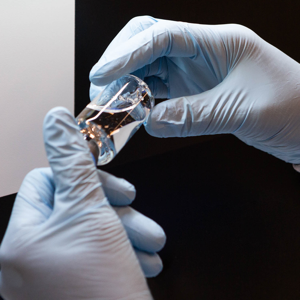By Ethan Covey
COVID-19 patients treated with remdesivir (Veklury, Gilead Sciences) saw a 54% lower mortality risk at 28 days than those receiving standard-of-care (SOC) therapy, according to a study presented at the World Microbe Forum (poster WMF21-29969).
The findings were found regardless of a patient’s baseline oxygen requirements.
The study included data from 3,400 COVD-19 patients, 1,974 of whom received remdesivir and 1,426 of whom received the SOC treatment. The primary end point evaluated whether remdesivir was associated with a statistically significant reduced mortality at day 28 for all patients requiring oxygen supplementation at baseline. The secondary end point of the study evaluated whether treatment with remdesivir was associated with a significantly increased likelihood of hospital discharge by day 28 after completion of 10 days of remdesivir treatment.
The analysis found that treatment with remdesivir was associated with a statistically significant reduction in mortality regardless of a patient’s baseline oxygen requirement.
In addition, patients who completed a 10-day course of remdesivir therapy had a significantly shorter time to discharge within 28 days compared with those receiving SOC therapies. This was true both in the overall group and among patients on low- or high-flow/noninvasive ventilation oxygen support at baseline.
“While randomized clinical trials [RCTs] remain the best tool for assessing the efficacy and safety of a medicine, ‘real-world’ evidence [RWE] provides important data on a treatment’s use in clinical practice that can complement data from RCTs,” a Gilead Sciences spokesperson said. “These studies take on greater incremental importance in a pandemic where clinical management of a disease continues to evolve and can outpace the initiation of new clinical trials, and where front-line health care workers are eager for RWE to guide and reinforce treatment decisions in real time.”
In related news, Norwegian (NOR)-Solidarity study, an independent, add-on, randomized controlled trial to the World Health Organization Solidarity trial, found that neither remdesivir nor hydroxychloroquine (HCQ) affected viral clearance in hospitalized patients with COVID-19 (Ann Intern Med 2021 Jul 13. https://doi.org/10.7326/M21-0653).
The WHO Solidarity trial showed no effect of remdesivir or HCQ on mortality, but did not assess antiviral effects of these drugs.
Researchers from Oslo University Hospital, Norway, and collaborators randomly assigned 181 hospitalized patients in 23 hospitals in Norway to receive remdesivir (n=42), HCQ (n=52) or SOC (n=87) to evaluate the effects of remdesivir and HCQ on all-cause, in-hospital mortality; the degree of respiratory failure and inflammation; and viral clearance in the oropharynx. The researchers found no significant differences between treatment groups in mortality during hospitalization. Remdesivir and HCQ did not affect the degree of respiratory failure or inflammation. There was a significant decrease in SARS-CoV-2 load in the oropharynx during the first week in all treatment groups, with similar decreases and 10-day viral loads. The lack of antiviral effect with remdesivir and HCQ remained consistent despite patient age, symptom duration, degree of viral load and presence of antibodies against SARS-CoV-2.
The researchers noted that overall mortality in NOR-Solidarity was lower than in the WHO Solidarity trial. This could be due to early lockdown policies in Norway during the initial phase of the pandemic, reducing pressure on hospitals and health care systems. Norway also had lower rates of comorbid conditions, such as diabetes and chronic heart disease.
However, based on their findings, the researchers question the antiviral potential of remdesivir and HCQ.




